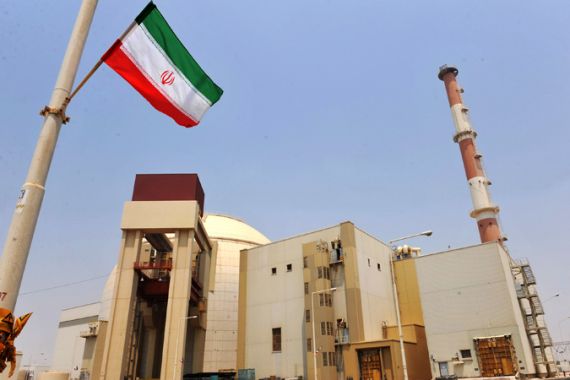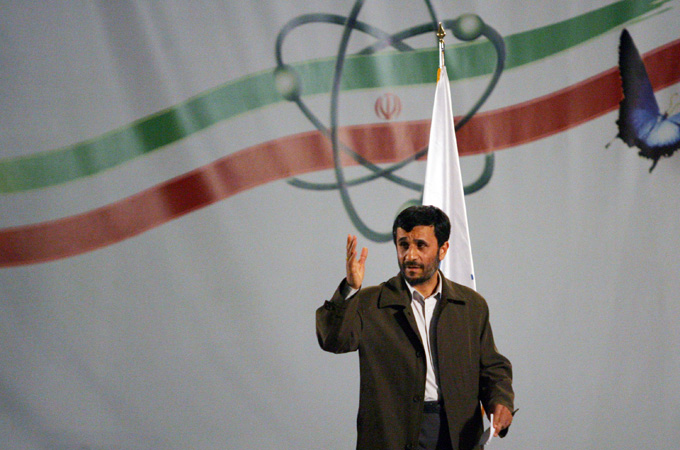US report urges tougher stance against Iran
Bipartisan policy paper advocates escalation in covert activities and verbal assaults to halt Iran’s nuclear programme.

 |
| Iranian president Mahmoud Ahmadinejad speaks at a 2007 ceremony in the Natanz nuclear enrichment facility [Getty] |
The United States should deploy ships, step up covert activities and sharpen its rhetoric to make more credible the threat of a Western military strike to stop Iran’s nuclear programme, according to report by a bipartisan group of former politicians, generals and senior officials.
The report, released on Wednesday by a Bipartisan Policy Center (BPC) task force of Democrats, Republicans and independents, said that the best chance of stopping Iran’s suspected pursuit of nuclear weapons was to make clear US willingness to use force, although it stopped short of advocating military action.
Tensions over Iran’s nuclear programme have heightened in recent weeks as the US, backed by the EU, imposed sanctions against Tehran and bolstered its naval presence in the Gulf region.
US President Barack Obama’s administration has repeatedly said that all options are on the table.
The BPC report suggests that to persuade Iran to address questions about its nuclear programme via negotiations, economic sanctions must be accompanied by a credible threat of military attack against Iran’s nuclear facilities.
“The United States needs to make clear that Iran faces a choice: it can either abandon its nuclear programme through a negotiated arrangement or have its programme destroyed militarily by the United States or Israel,” said the report, entitled “Meeting the Challenge: Stopping the Clock.”
Diplomatic window
Meanwhile, other senior US officials said on Tuesday that sanctions and diplomacy may yet persuade Iran to give up its nuclear programme, as its leaders had shown a rational “cost-benefit approach” in their calculations.
Top intelligence officials suggested that military conflict with Iran was not inevitable, despite soaring tensions with Tehran and a war of nerves over the strategic Strait of Hormuz, a key oil trade route.
“We judge Iran’s nuclear decision-making is guided by a cost-benefit approach, which offers the international community opportunities to influence Tehran,” James Clapper, Director of National Intelligence, told the US Senate Select Committee on Intelligence.
“Iranian leaders undoubtedly consider Iran’s security, prestige, and influence, as well as the international political and security environment, when making decisions about its nuclear programme,” he said.
He said economic sanctions were taking a toll and described a worsening rift between Iran’s Supreme Leader Ali Khamenei and President Mahmoud Ahmadinejad.
The overriding goal of Iran’s leaders remained “regime survival”, and it was too early to say how economic strains triggered by tougher sanctions would affect their decisions, David Petraeus, the CIA director, told the same hearing.
With a run on the Iranian currency, inflationary pressures and unemployment, the sanctions were “biting” more now than ever before, Petraeus said.
The comments by senior intelligence officials echoed Obama’s assessment in his State of the Union address last week, when he said “a peaceful resolution” remained possible with Iran.
The head of the intelligence committee, Senator Dianne Feinstein, meanwhile revealed that Israel’s spy chief Tamir Pardo had visited Washington last week, amid speculation over a possible Israeli strike on Iran.
Such trips are usually secret, but Feinstein mentioned Pardo’s visit at the televised hearing as she discussed how Israel views Iran’s nuclear ambitions.
When asked by Feinstein about the likelihood of pre-emptive Israeli military action, Clapper replied that he would prefer to answer in a closed-door session but said sanctions might force Tehran to change course.